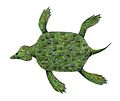Termatosaurus
Appearance
| Termatosaurus Temporal range: Late Triassic,
| |
|---|---|

| |
| Teeth of T. albertii | |
| Scientific classification | |
| Domain: | Eukaryota |
| Kingdom: | Animalia |
| Phylum: | Chordata |
| Class: | Reptilia |
| Clade: | Archosauromorpha |
| Clade: | Archosauriformes |
| Clade: | Eucrocopoda |
| Clade: | Archosauria |
| Genus: | †Termatosaurus Meyer & Plieninger, 1844 |
| Type species | |
| †Termatosaurus albertii Meyer & Plieninger, 1844
| |
| Species | |
Termatosaurus ("End Lizard", due to its appearance in the End Triassic) is a potentially dubious[1] genus of archosaur known from several tooth specimens. Its remains come from the Upper Triassic of France, England, Germany and Switzerland. Termatosaurus was once thought to have survived until the Early Jurassic, but the attributed Jurassic remains were redescribed as plesiosaur material. Two species are known of this animal: the type species, T. albertii, named by Meyer and T. Plieninger in 1844,[2] and T. crocodilinus, by Quenstedt (1858).
According to Oskar Kuhn, Termatosaurus is a plesiosaur (of the Rhomaleosauridae),[3][4] while according to other sources, it is a phytosaur.[5]
Gallery
-
Tooth of T. albertii
References
- ^ Stocker, M. R.; Butler, R. J. (2013). "Phytosauria". Geological Society, London, Special Publications. doi:10.1144/SP379.5.
- ^ H. v. Meyer and T. Plieninger. (1844). Beiträge zur Paläontologie Württemberg’s, enthaltend die Fossilen Wirbelthierreste aus den Triasgebilden mit Besonderer Rücksicht auf die Labyrinthodonten des Keupers [Contributions to the Paleontology of Württemberg, Including the Fossil Vertebrate Remains from the Triassic Formations with Special Regard to the Labyrinthodonts of the Keupers] 1-132
- ^ O. Kuhn. (1964). Ungelöste Probleme der Stammesgeschichte der Amphibien und Reptilien [Unsolved problems of the phylogeny of amphibians and reptiles]. Jahreshefte des Vereins für vaterländische Naturkunde in Württemberg 118/119:293-325
- ^ O. Kuhn. (1971). Die Saurier der deutschen Trias [Reptiles of the German Triassic] 1-105
- ^ H. v. Meyer. (1845). System der fossilen Saurier [Taxonomy of fossil saurians]. Neues Jahrbuch für Mineralogie, Geognosie, Geologie und Petrefakten-Kunde 1845:278-285








